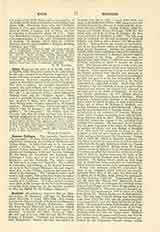

Supplemental information from the Index volume
Roman Colleges.-The Apostolic Constitution “In praecipuis”, 29 June, 1913, promulgates the new regulations concerning the training of the Roman and Italian clergy. In brief, there are to be two seminaries: a smaller, for “gymnasial” students, in the present Vatican Seminary; and a greater, for philosophers and theologians, in the new Lateran building. To the latter are transferred the Seminario SS. Ambrogio e Carlo, now to be part of the Roman Seminary; and the Seminario Pio, which retains the laws as to its scope and character. The faculties of philosophy and theology of the Roman Seminary are to be in the Lateran Seminary; the law department goes to the Collegio Leoniano, but remains a school of the Seminary. The Collegio Leoniano shall receive only priests, duly authorized to pursue higher studies. The Academia Theologica of the Sapienza remains at S. Apollinare. All Italian clerical students must abide in the Lateran or the Vatican Seminaries, excepting those preparing for the heathen missions or who are eligible for the Collegio Capranica.

